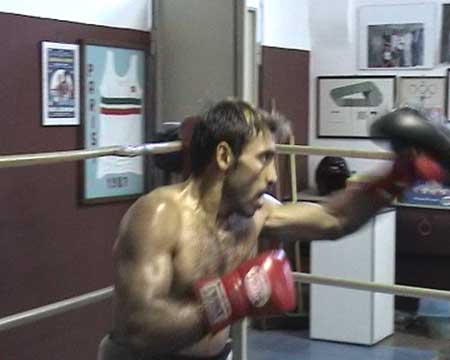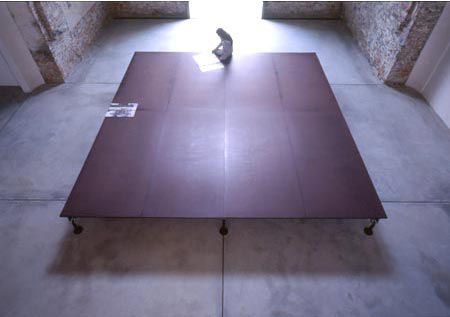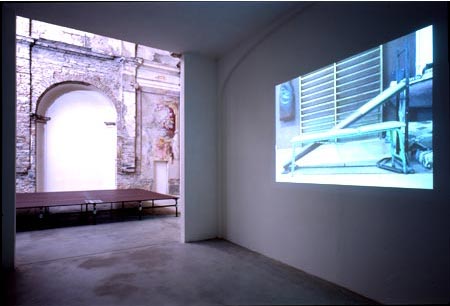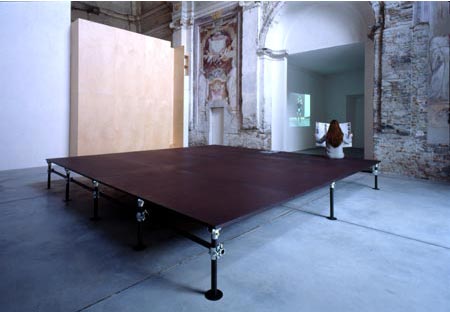4
boxing gyms in Northern Italy
Between
the months of May and July 2002 Andrea Crociani visited four boxing
gyms in Northern Italy and did a series of video shots and interviews with
boxers in various categories, both amateur and professional. With the video material
gathered he made a 40 minute film documenting the activity in the different gyms.
At borgovico 33 the video will be continuously
projected in the entrance hall while in the principal space of the church,
a 5 x 5 meter platform will be placed in the center serving as a sort
of "ring" — "meeting" place — where the
spectator can sit on the edge and read the magazine-paper the artist put
together of the interviews he did with eight boxers. In this project Crociani
focuses attention on the boxing world which is highly conditioned by stereotypes
that are quite far from reality. Crociani makes a broader attempt to undermine
preconceptions using investigation and a direct understanding of a specific
situation.
Download
the interviews ![]()

The photographic series entitled Cocktails (1999-2000) is made up of various cocktail recipes illustrated with images pertaining to the Second World War; both images are taken from books. The combination between text and images generates an unusual reaction producing different sense elements. In the video L’archivazione è un’arte borghese /archiving is a bourgeois art (2000), 84 technical drawings of warplanes (viewed frontally, laterally and from above) are repeatedly projected for half a second.
The obsessive interaction transforms the initial formal beauty of the drawing into a signal of violence. Signor Errico Malatesta (2001), a one person show at the Juliane Wellerdiek Gallery in Berlin, is made up of a long text written by the artist on Errico Malatesta, the Italian anarchist. The text is available to the visitor at a symbolic price so that he can take it away with him for more in-depth reading. The text is accompanied by a video that shows the artist’s Berlin apartment with the objects that compose and define it, and five photographic portraits of Malatesta.

Andrea Crociani was born in Switzerland in 1970 and lives and works in Berlin and London.
He studied at the Brera Academy, Milan where he graduated in 1994.
In 1998 and 1999 he received a Swiss Fine Arts Scholarship and in 1999-2000 he was chosen for the Swiss Studio in Berlin program with residency for a year.
1997 1998 1999 2000 2001 2002 1995 1997 1998 1998 1998 1997-1999 2001 2001 2002 |
To
cite some of his one person shows Anonymous Collective, Galerie Heinrich Schmidt, Grenzach-Wyhlen Konsumbäckerei, Solothurn Compleanno per i 18 anni della mia auto, azione, 16 giugno, Milano Cocktails, Galerie im Parkhaus, Berlin NB, (con Claudia e Julia Müller), Kunsthalle St.Gallen, St.Gallen Signor Errico Malatesta, Galerie Juliane Wellerdiek, Berlin 4 palestre di pugilato del nord italia, borgovico 33, Como A selection of group shows Young Art, Kunsthalle Bern, Bern Prix Fédéral des Beaux-Arts, Musée Cantonal des Beaux-Arts, Espace Arlaud, Lausanne Fuori Uso, Pescara Galerie ak programm K. Adamopoulos, Frankfurt/M Eidgenössischer Preis für Freie Kunst, Museum zu Allerheiligen, Schaffhausen Fragile, Museo Cantonale d’Arte, Lugano, Musée des Beaux-Arts, Tourcoing, Liverpool biennial, Liverpool Trading Spirit, TENT - Centrum Beeldende Kunst Rotterdam, Rotterdam If we were Kings, Kunst und Medienzentrum Adlershof, Berlin L’immagine ritrovata. Pittura e fotografia dagli anni ’80 ad oggi, Museo Cantonale d’Arte, Lugano, E.N.E.R.G.I.E, site specific projects, with Anna Best, Brussels |


